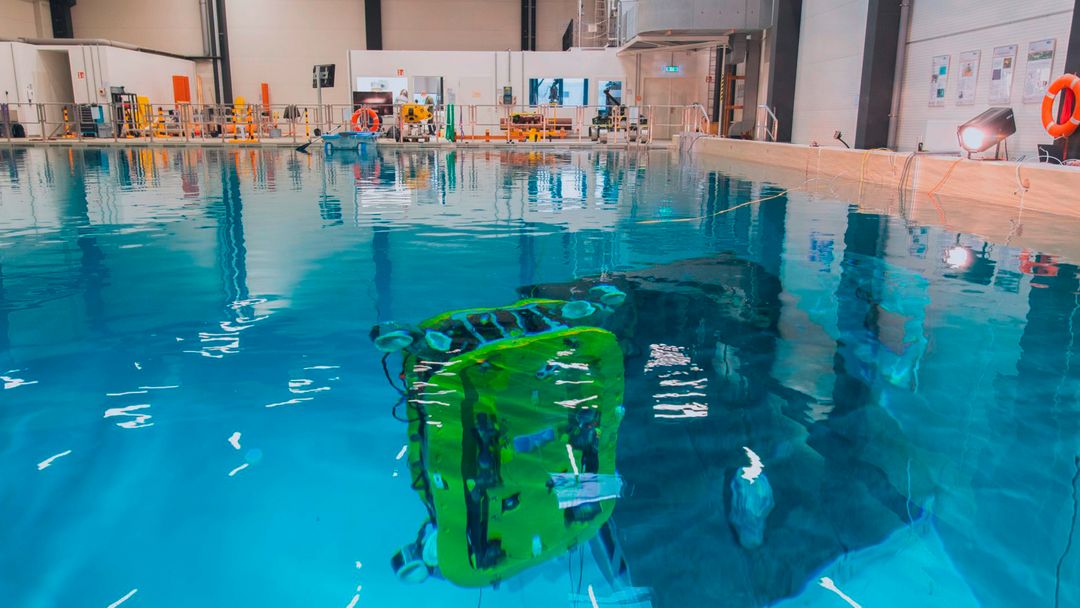
Launch of the Robotics Institute Germany: DFKI supports German robotics network with expertise and infrastructure
| Robotics | Innovative Factory Systems | Intelligent Networks | Robotics Innovation Center | Kaiserslautern | Bremen | Press release

With its launch on July 1, the Robotics Institute Germany (RIG) will begin its work to establish Germany as a leading nation in intelligent robotics through cutting-edge research and talent development, thereby ensuring global competitiveness and economic growth. To this end, it will combine existing strengths and foster collaboration in a strong network to accelerate innovation and develop responsible robotics solutions for societal challenges. The Technical University of Munich (TUM) leads the RIG consortium, which includes ten universities and four non-university research institutions.
DFKI supports the development of the RIG, especially in the areas of infrastructure, education and transfer for AI-based robotics. In addition, the integration of existing research and development results into the structures of the RIG will be a central component to make innovative robotics and AI technologies visible and to establish Germany as a pioneer in AI-based robotics.

"We are delighted to be part of the new Robotics Institute Germany and to be able to contribute our many years of expertise in the fields of artificial intelligence, robotics and networked systems. With our unique test infrastructure and the close integration of research and practice, we want to help drive groundbreaking developments to strengthen Germany's competitiveness and shape a sustainable future."
Test infrastructure for advanced robotics
DFKI has a large number of state-of-the-art robotics test infrastructures and laboratories, including mechanical and electronic workshops, which are actively involved in the RIG project. Particularly noteworthy are the Maritime Exploration Hall and the multifunctional hall with artificial lunar crater landscape at the Robotics Innovation Center in Bremen and the Smart Factory in Kaiserslautern. This infrastructure is made available to the RIG partners and enables the development and testing of real robots, the realization of digital twins, and the integration of intelligent networking, localization, and application-oriented sensor data acquisition.
Research departments from Bremen and Kaiserslautern involved
Since its foundation in 1988, DFKI has built up extensive expertise in the field of robotics, both in software and hardware development. It is active in numerous national and international networks and has a large number of unique test infrastructures and robot systems. The research departments involved in the RIG include the Robotics Innovation Center in Bremen and the departments Intelligent Networks and Innovative Factory Systems in Kaiserslautern.
The Robotics Innovation Center develops solutions for autonomous mobile and humanoid robots as well as robotic assistance systems with high transfer potential: applications in medicine, industrial production or the deep sea benefit from the robust systems designed for the space context. With its work in the field of underwater robotics, the Bremen-based company is creating important infrastructural prerequisites for the expansion of sustainable resource and energy production.
The research departments Intelligent Networks and Innovative Factory Systems are contributing their extensive expertise in artificial intelligence and the development of networked systems in robotics and collaborative robotics (cobotics) to the RIG project. This includes the implementation of AI to improve autonomous decision making and the use of innovative sensors and evaluation platforms developed specifically for fleet robotics and cobotics.
Talent development and international competitions
Another focus of DFKI within RIG is talent development and education in the field of AI-based robotics. DFKI is planning various measures to train specialists and managers in companies, including continuing education programs, workshops, and in-house courses. In addition, programs and mentoring initiatives will support the promotion of young scientists.
In order to evaluate and improve the performance of robotic systems, DFKI helps to identify international robotics competitions and challenges. It will actively participate in the planning and implementation of events to evaluate research results in an international comparison.
Encouraging industry collaboration
Finally, as a RIG partner, DFKI strives for close cooperation with industry in order to translate research results into marketable products and services. To this end, it makes its infrastructure available for test runs and plans to participate in national and international trade fairs. By establishing partnerships and promoting technology transfer activities, relevant research results identified together with industry are to be transferred into industrial innovation pipelines.
Institutions involved in the Robotics Institute Germany: |
In addition to DFKI, the RIG consortium is led by the Technical University of Munich, the Karlsruhe Institute of Technology (KIT), the University of Bonn, the Technical University of Berlin, the Technical University of Darmstadt, the University of Bremen, the University of Stuttgart, RWTH Aachen University, the Technical University of Dresden, the Technical University of Nuremberg, the German Aerospace Center (DLR), the Max Planck Institute for Intelligent Systems and the Fraunhofer Institutes IPA, IOSB and IML. The universities of Augsburg, Bayreuth, Bielefeld, TU Braunschweig, TU Chemnitz, Erlangen-Nuremberg, Freiburg, Hamburg, Hanover, Heidelberg, TU Ilmenau, Kaiserslautern-Landau, Lübeck, LMU Munich, Tübingen, Baiosphere, Cyber Valley GmbH, Hessisches Zentrum für Künstliche Intelligenz and Deutsches Rettungsrobotik-Zentrum e.V. are associated. |
Further information on the RIG can be found at: https://www.robotics-institute-germany.de/ |
Contact:
Prof. Dr. Dr. h.c. Frank Kirchner
RIG-Koordinator am DFKI
- Frank.Kirchner@dfki.de
- Phone: +49 421 17845 4101